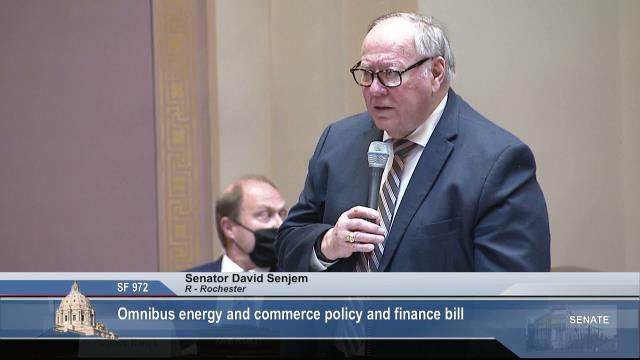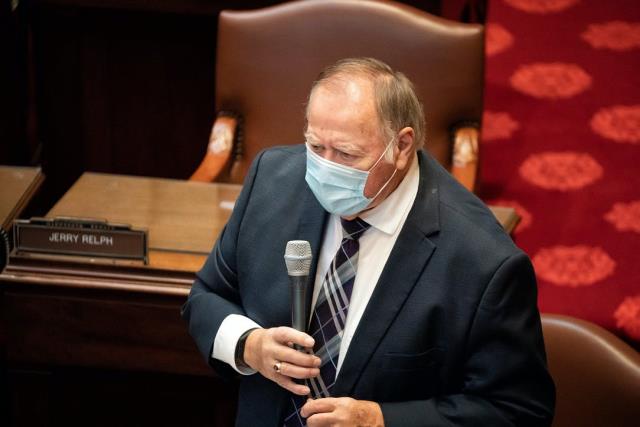Dear Friends,
After returning from a weeklong break both the Senate and House focused to finalize several omnibus budget bills. Last week the Higher Education, Commerce and Energy, Agriculture & Rural Development and Judiciary omnibus bills were passed by the Senate. Eventually these bills will need to be merged or negotiated with the House omnibus bills through a conference committee.
This week the remaining omnibus budget bills will be sent to the Senate floor, where legislators will spend much of their time debating and finalizing budget proposals.

Below are notable inclusions in the omnibus bills passed by the Senate:
Judiciary Omnibus Budget Bill
Keeping Minnesotans safe and hold criminals accountable was the focus of the Judiciary and Public Safety budget bill SF 970.
A major advancement included in this bill is Senate File 1683. As the chief author of this bill, it will close the “intoxication loophole” brought to light by a Supreme Court ruling that overturned a sexual assault conviction because the victim was voluntarily inebriated. I wanted to make sure the Senate consistently support and create stronger laws to combat sexual assault and to bring awareness to victims of sexual assault.

This bipartisan bill helps to protect our most vulnerable by prioritizing safety for all Minnesotans. We need to stand with the survivors of sexual assault during this turbulent time. The law should never be on the offender’s side and we must give survivors the justice they deserve.
KAAL –Minnesota lawmaker aim to strengthen sexual assault laws
Additional Highlights included in the Judiciary Omnibus bill:
- Increased penalties on child pornography, sex trafficking and solicitation of children, and child torture
- Harsher penalties for individuals selling fentanyl.
- Increased probation funding to supervise and protect communities where offenders live.
- Expansion of alternatives to incarceration for nonviolent offenders
- Appropriation for the “Healthy Start Act,” a temporary release program for pregnant and postpartum inmates.
Policing Reforms:
In the 2020 Special Session, Senate Republicans passed a widely supported, bipartisan package of common-sense reforms for Minnesota law enforcement. That legislation included:
- Chokehold ban
- Duty to intervene.
- Training on crisis response and flexibility
- Plus, many other reforms to ensure thesafety of our officers and Minnesotans.
Commerce and Energy Omnibus Budget Bill
The Minnesota Senate passed the Senate’s Energy & Commerce Budget. The biennial budget bill provides funding for critical programs in the Department of Commerce, maintains Minnesota’s reliable energy network, and continues the state’s successful reinsurance program.
In 2016 insurance premiums for the individual market for health care insurance increased by double digits due to changes from the Affordable Care Act. This led to the reinsurance program, and as a result Minnesota now has some of the lowest rates in the country. The Senate voted in bipartisan fashion earlier this year to continue the reinsurance program through 2022.
Included in the Commerce and Energy Omnibus bill is funding for the state’s successful reinsurance program through 2023 provides a proven program that has already saved Minnesotan’s money on the costs of health care. The bill funds the Department of Commerce at current levels, shores up an operating deficit in the Department’s Insurance Division, and funds a grant to the Minnesota Council on Economic Education (MCEE). This grant provides financial literacy education to children, so they can successfully manage their personal budgets as adults.
The Energy portion of Senate File 972 includes SF 2075 the Energy, Utilities omnibus bill. This bill focuses on measured, thoughtful changes to Minnesota’s energy and telecom policy. It contains comprehensive funding for the two-year energy budget and renewable energy development.

Polls confirm that Minnesota strongly favors moving towards a clean energy future, provided it is affordable and reliable. As the Chair of the Energy and Utilities Finance and Policy Committee, this past year alone has shown how vital it is to facilitate innovation in our state energy production. It is imperative that we make improvements consistent with the opinions of our citizens and the direction being taken to combat climate change.
Inclusions in the Energy Omnibus bill:
- $8 million for the Solar Rewards Program, which incentivizes utilities which use solar systems,
- Modifies utility reporting to achieve the new solar standard by July 1, 2021.
- Establishes a Solar for Schools Program to provide grants to aid in the installation of solar energy systems on or adjacent to school buildings.
- Abolishes the current nuclear moratorium that would then allow for discussions of new nuclear technology.
- Creates a state building energy conservation improvement account to implement energy conservation and energy efficiency improvements in state buildings.
- Expands Minnesota’s broadband market to provide robust broadband to all corners of the state and modernize the crucial telecom market.
Higher Education Omnibus Budget Bill
The Senate passed the Higher Education Omnibus bill passed SF 975 which provides crucial investments in the University of Minnesota and the Minnesota State Colleges and Universities system. The bill is student-focused and works to keep college more affordable.

Making college more affordable is at the heart of the Senate’s Higher Education Budget. The bill includes:
- A 10% reduction of the family contribution in the state grant program.
- Requires 8 more colleges to offer zero-textbook cost associates degrees.
- Allocates a $4 million increase in workforce scholarships.
- A 5% tuition cut for students attending Minnesota State schools.
- A 3% tuition cut for U of M students.
- Establishes a new grant program that allows teens who entered foster care to attend college for free at any participating public or private school in Minnesota.
- Requires Minnesota State to refund students who were charged an extra online course fee during the pandemic.
- Includes $500 COVID risk stipends for faculty who had to teach class face to face in Spring 2021 when vaccines were available.
Overall, the Senate Higher Education Omnibus budget bill establishes several new student-centered programs to address the most pressing issues facing students this year including reducing tuition, increasing student aid and scholarships, decreasing textbook costs, addressing food and housing insecurity, and increasing mental health supports.
Agriculture, Rural Development, and Housing Omnibus Budget Bill
The Minnesota Senate passed the Agriculture SF 958 to support agriculture, rural development, and rural COVID-19 recovery. The comprehensive legislation is focused on helping Minnesota farmers while spurring innovation in the agriculture industry and provides resources for broadband expansion throughout the state.

The legislation helps our agricultural community recover from the pandemic by strengthening our Ag sector supply chains and invests in helping more meat processing facilities expand and grow. Ultimately these investments will provide more jobs, improve our processing efficiency, and provide more purchasing options for consumers.
Included in the Senate Agriculture Budget:
- Gives historic funding to the Border-to-Border Broadband Grant program at $40 million over the next two fiscal years.
- Provides a $3.5 million grant to improve biofuel infrastructure by allowing gas stations to sell higher blends of biofuels.
- Includes grants for farm safety equipment.
- Allows the creation of a grain storage facility safety curriculum.
- Mental health outreach on farms and additional mental health services are also included, which continues funding for the existing 24-hour crisis hotline.
